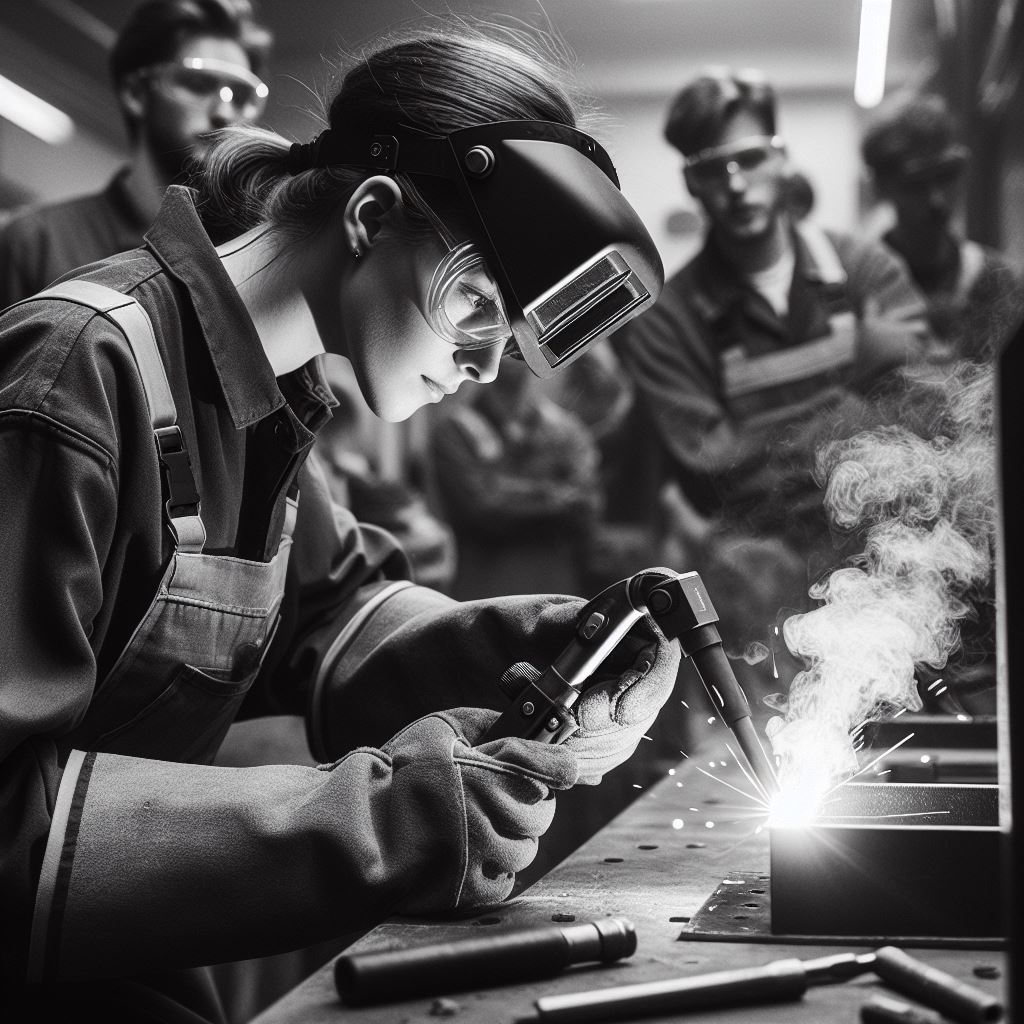Introduction
Welder health is crucial to ensure safety and avoid hazards in the UK. Welders face numerous risks and dangers that need attention.
Welders work in an environment with potential hazards such as fumes, gases, and toxic substances.
The exposure to these elements can lead to respiratory problems, eye injuries, and even long-term health issues.
Furthermore, welders also face risks of burns, electric shocks, and accidents due to the nature of their work.
It is important to prioritize safety measures and employ proper protective equipment to avoid such hazards.
Implementing ventilation systems and using appropriate masks can significantly reduce the risk of inhaling harmful fumes.
Regular eye check-ups and the use of safety goggles are crucial to protect the eyes from sparks and ultraviolet radiation.
Training programs and proper education on safety procedures can help welders identify potential hazards and respond effectively.
Employers should conduct regular risk assessments and provide a safe working environment for welders.
Creating awareness about the importance of welder health and safety is essential to prevent workplace accidents and health issues.
In general, welder health and the avoidance of hazards are immensely significant in the UK. Emphasizing safety measures and providing appropriate training can protect welders from potential dangers.
Common Hazards in Welding
- Excessive heat
- UV radiation
Welders confront health hazards, notably harmful fumes, released when metals melt during welding. Toxic gases, including manganese and lead, pose short-term issues like dizziness and nausea.
Long-term exposure may lead to lung damage, asthma, and cancer. Excessive heat in welding exposes welders to burn risks from hot metal or sparks.
Burn severity varies, requiring prompt medical attention. Intense UV radiation emitted during welding can cause severe eye injuries like welder’s flash or arc eye.
Symptoms include eye pain, redness, tearing, and temporary vision loss. These hazards impact welders significantly.
Personalized UK Career Consulting
Receive tailored career guidance designed just for you. Get actionable steps and expert support to boost your career in 1-3 days. Take control of your career now.
Get StartedOver 2,000 UK welders annually suffer welding fume-related illnesses. Welders face a higher lung cancer risk due to exposure to harmful substances.
Excessive heat can cause severe burns, resulting in skin damage and potential infection. Burns may lead to long-term scarring, affecting the welder’s quality of life.
UV radiation can cause lasting eye damage, leading to vision problems or permanent blindness.
Protecting welders is crucial. Proper personal protective equipment (PPE), including respirators and welding curtains, minimizes exposure.
Employers should prioritize ventilation in welding areas and provide regular safety training. Welders must be aware of risks and take precautions for their well-being.
In essence, welding hazards include harmful fumes, excessive heat, and UV radiation, impacting respiratory, skin, and eye health.
Proactive measures, like PPE use and safety protocols, safeguard welders’ well-being.
Read: Underwater Welding: A Niche in the UK
Health Effects of Welding Hazards
Welding hazards can have serious health effects on welders. These effects can vary depending on the type of hazard and the level of exposure.
Some of the specific health issues associated with welding hazards include respiratory issues, eye injuries, and skin burns.
Respiratory Issues
- Welding fumes contain toxic gases and particles that can be inhaled by welders.
- Inhalation of these fumes can lead to respiratory problems such as coughing, wheezing, and shortness of breath.
- Prolonged exposure to welding fumes can cause more serious respiratory conditions such as asthma, bronchitis, and even lung cancer.
Eye Injuries
- Welding involves intense heat and bright light, which can cause severe damage to the eyes if proper protection is not used.
- Welding arc emits harmful ultraviolet (UV) and infrared (IR) radiation that can burn the eyes and cause temporary or permanent vision impairment.
- Welding sparks and debris can also fly into the eyes, leading to injuries such as corneal abrasions or foreign object inflammation.
Skin Burns
- Welding generates high temperatures that can cause burns if the skin comes into direct contact with the welding arc, sparks, or hot metals.
- Burns can range from mild redness and blistering to more severe third-degree burns that require medical attention.
- Proper protective clothing, including flame-resistant gloves and clothing, is essential in preventing skin burns.
Aside from the immediate health effects, long-term consequences can arise from repeated exposure to welding hazards.
Chronic respiratory conditions such as welder’s lung or pneumoconiosis can develop over time, leading to permanent lung damage and disability.
Welders are also at risk of developing occupational diseases such as metal fume fever, caused by inhalation of zinc or other metal fumes.
This condition can cause flu-like symptoms, including fever, chills, headaches, and muscle aches.
Your Dream Job Starts with a Perfect CV
Get a tailored CV and cover letter that captures your unique strengths and stands out in your industry. Let us help you make an unforgettable first impression.
Get StartedAnother long-term consequence of welding hazards is the increased risk of certain types of cancer. Studies have linked welding fumes to lung, laryngeal, and urinary tract cancers.
Welders who work in confined spaces with poor ventilation are particularly vulnerable to these health risks.
It is crucial for welders to take appropriate safety precautions to avoid these health effects. This includes wearing respiratory protection, such as respirators or face masks, to minimize exposure to welding fumes.
Welding helmets with appropriate shading filters should be worn to protect the eyes from UV and IR radiation.
Regular breaks in well-ventilated areas can help reduce the accumulation of welding fumes.
Employers also have a responsibility to provide proper training, equipment, and adequate ventilation systems to ensure the health and safety of their workers.
In review, welding hazards can have significant health effects on welders. From respiratory problems to eye injuries and skin burns, the risks associated with welding should not be taken lightly.
It is essential for welders and employers to prioritize safety measures to prevent the long-term consequences and potential occupational diseases associated with welding.
Read: Best Welding Techniques: Tips for UK Welders
Preventive Measures
Welding is a high-risk occupation that exposes workers to various health hazards. However, by implementing preventive measures, welders can significantly minimize these risks.
Here are some essential steps welders should take to protect their health:
1. Use Proper Protective Equipment
Wearing appropriate protective gear is crucial in welding environments to safeguard against potential hazards. Some essential protective equipment includes:
- Safety goggles: Protect your eyes from sparks, debris, and harmful ultraviolet (UV) radiation.
- Respirators: Prevent inhalation of toxic fumes, gases, and dust particles, ensuring respiratory safety.
- Heat-resistant clothing: Shield your skin from burns, sparks, and extreme heat.
By using these protective items, welders can create a barrier between themselves and potential health risks.
2. Ensure Adequate Ventilation
A well-ventilated workspace is critical for preventing exposure to welding fumes and gases. Proper ventilation helps to eliminate toxic airborne substances. Welders should:
Optimize Your LinkedIn for Success
Boost your LinkedIn profile with a professional bio, keyword-rich headline, and strategic recommendations that attract recruiters. Stand out from the crowd and get noticed.
Optimize Now- Work in open areas or well-ventilated workshops with good airflow.
- Use local exhaust ventilation systems to capture and remove fumes at the source.
- Position their workstations strategically to avoid stagnant air pockets.
By ensuring proper ventilation, welders can significantly reduce the inhalation of harmful substances and minimize associated health risks.
3. Monitor Air Quality
Regular monitoring of air quality is vital to identify any potential health hazards in welding environments. It helps in evaluating exposure levels and ensuring compliance with safety standards.
Monitoring should include:
- Air sampling: Collecting air samples to assess the concentration of hazardous substances.
- Periodic testing: Conducting regular tests to check for any variations in air quality over time.
- Monitoring devices: Using portable monitors to measure gases, fumes, and particulate matter.
By monitoring air quality, welders can promptly identify any risks and take appropriate actions to mitigate them.
4. Practice Good Hygiene
Maintaining proper hygiene practices is essential to minimize potential hazards in the welding profession. Some key hygiene measures for welders include:
- Regular handwashing: Thoroughly wash hands before eating, drinking, or touching the face.
- Using designated eating and drinking areas away from the work environment.
- Removing contaminated clothing and equipment before leaving the workplace.
By practicing good hygiene, welders can minimize the transfer of toxic substances from their hands and clothing to other areas.
5. Receive Adequate Training and Education
Proper training and education are essential for welders to understand and minimize the associated health risks. Employers should provide:
- Comprehensive training on welding techniques, safety practices, and hazard awareness.
- Information on the correct use of protective equipment and proper ventilation.
- Regular updates on the latest safety guidelines and regulations.
By equipping welders with the necessary knowledge and skills, they can actively protect themselves from potential health hazards.
Overall, welders must prioritize their health and safety by implementing preventive measures.
By using proper protective equipment, ensuring adequate ventilation, monitoring air quality, practicing hygiene, and receiving adequate training, welders can minimize health risks and create a safer working environment.
Read: Women in Electrical Work: UK Trends

Safety Regulations and Laws
Welding is a crucial yet hazardous activity that requires strict adherence to safety regulations and laws in the United Kingdom.
These regulations are in place to protect both the employees and the general public from potential hazards. Failure to comply with these regulations can result in severe penalties and legal consequences.
Existing Safety Regulations and Laws
The Health and Safety Executive (HSE) in the UK has established several regulations specifically targeting welding and related activities.
The primary regulation in this regard is the Control of Substances Hazardous to Health (COSHH) Regulations of 2002.
COSHH Regulations aim to control exposure to hazardous substances, including fumes, gases, and dust produced during welding processes.
It mandates the assessment and management of risks associated with these substances.
Additionally, the Personal Protective Equipment at Work Regulations of 1992 requires employers to provide suitable protective equipment, including eye shields, helmets, gloves, and protective clothing, to their employees.
Other relevant regulations include the Management of Health and Safety at Work Regulations 1999, which requires risk assessments and appropriate safety measures, and the Provision and Use of Work Equipment Regulations of 1998, which ensures the safe use of equipment.
Responsibilities of Employers and Employees
Both employers and employees have distinct responsibilities in upholding the safety regulations and laws regarding welding activities. Employers are primarily responsible for providing a safe working environment.
They must assess and manage risks associated with welding processes, implement controls to minimize exposure to hazardous substances, and provide appropriate training and supervision to their employees.
Furthermore, employers must ensure that suitable and well-maintained personal protective equipment is readily available to their workforce.
Regular inspections of equipment and maintenance are also crucial to ensure its effectiveness.
On the other hand, employees have a responsibility to follow the safety procedures and guidelines established by their employers.
They must use the provided personal protective equipment correctly and report any hazards or risks they encounter during their work to their supervisors.
Penalties and Legal Consequences for Non-Compliance
Non-compliance with the safety regulations and laws regarding welding can have serious consequences for both employers and employees.
If an employer fails to meet their legal obligations, they can face enforcement actions by the HSE, including improvement notices, prohibition notices, and, in severe cases, prosecution.
Prosecution often leads to hefty fines, with recent cases seeing penalties reaching hundreds of thousands of pounds.
Employees themselves can also face legal consequences if they neglect their responsibilities or act recklessly, leading to accidents or injuries.
In such instances, they may be subject to disciplinary actions, including termination of employment and, in extreme cases, even criminal charges if found to be grossly negligent.
It is crucial for both employers and employees to understand and comply with the safety regulations and laws to protect themselves and others in the workplace.
Generally, safety regulations and laws in the UK play a vital role in ensuring the health and well-being of welders.
Employers must fulfill their responsibilities in providing a safe work environment, while employees must follow guidelines and use protective equipment correctly.
Non-compliance can lead to severe penalties and legal consequences, emphasizing the importance of upholding safety regulations in the welding industry.
Read: Electrician Tools: Must-Haves for Beginners
Training and Education
Training and education play a vital role in promoting the health and safety of welders. Proper training enables welders to understand the potential hazards associated with their work.
By being knowledgeable about welding techniques, welders can reduce the risk of accidents. Understanding hazard identification helps welders to recognize and minimize potential dangers.
Education provides welders with the necessary knowledge to use equipment correctly and safely.
Moreover, continuous training and education ensure that welders stay up-to-date with the latest industry standards and best practices.
Importance of Understanding Welding Techniques
- Welding involves various techniques, each with its own set of hazards.
- Being aware of these techniques allows welders to select the most suitable method for a specific job.
- Understanding welding techniques also helps welders to choose appropriate safety measures.
- By mastering different techniques, welders can optimize their workflow while minimizing health risks.
- Regular training enables welders to refine their skills and improve their efficiency.
Significance of Hazard Identification and Proper Equipment Use
- Identifying hazards is crucial for preventing accidents and injuries in welding.
- Through training, welders learn to identify common hazards such as fumes, heat, and electrical shocks.
- Using appropriate personal protective equipment (PPE) is essential for welders’ safety.
- Training educates welders on the correct selection and usage of safety gear, such as helmets and gloves.
- Proper equipment use ensures that the welders are protected from potential health risks.
Available Training Programs and Certifications in the UK
The UK offers a range of training programs and certifications specifically designed for welders. These programs cover various aspects, including welding techniques, safety practices, and health regulations.
- The City and Guilds Welding Skills Certification Scheme is widely recognized and respected in the UK.
- Construction Skills Certification Scheme (CSCS) provides certification for welders working in construction sites.
- The Engineering Construction Industry Training Board (ECITB) offers specialized welding training courses.
- The Health and Safety Executive (HSE) provides guidance and resources for welder training and safety.
- Other training providers, such as trade schools and vocational centers, also offer welding courses.
Essentially, training and education are crucial for promoting welder health and safety.
By comprehending welding techniques, identifying hazards, and using equipment correctly, welders can safeguard their well-being.
Investing in training programs and certifications can enhance welders’ skills, effectiveness, and overall safety in the UK.
Support Systems for Welders
In the UK, welders have access to various support systems and organizations that aim to promote their health and provide assistance in case of any health issues.
Occupational Health Services
- Occupational health services play a crucial role in supporting welders’ health and well-being.
- These services assess and manage the risks associated with welding, ensuring a safe working environment.
- They provide regular health check-ups, monitoring welders’ overall health and detecting any potential issues early on.
- Occupational health services also offer advice on personal protective equipment (PPE) and safe working practices.
- They educate welders about the importance of proper ventilation and the potential hazards of inhaling fumes.
- If a welder experiences health problems related to their work, occupational health services provide guidance on managing those issues.
Organizations Supporting Welders
- Several organizations in the UK focus on supporting welders and promoting their health and safety.
- The British Occupational Hygiene Society (BOHS) provides valuable resources and guidance on managing welding hazards.
- BOHS also offers professional qualifications and certifications for those involved in occupational hygiene.
- The British Safety Council (BSC) promotes safe working practices and offers training courses for welders.
- SafeWeld UK is an organization specifically dedicated to welding safety, providing advice, training, and support to welders.
- These organizations often collaborate with employers and governmental agencies to ensure welders’ health is prioritized.
The Role of Support Systems in Promoting Welder Health
The support systems available for welders in the UK play a vital role in their overall health promotion and well-being.
Firstly, these support systems ensure that welders are aware of the potential hazards associated with their work.
They provide education and training on safe working practices, emphasizing the importance of protective equipment and proper ventilation.
Regular health check-ups offered by occupational health services help in monitoring welders’ health and detecting any health issues early on.
Moreover, the guidance and advice provided by support systems assist welders in effectively managing their health problems.
In case of any health issues related to welding, welders can rely on the support systems for necessary assistance and guidance.
They can seek professional advice, avail resources, and access training programs related to their occupational hygiene.
The collaboration between these support systems, employers, and governmental agencies ensures that the welfare of welders is prioritized throughout the UK.
Overall, these support systems and organizations play a crucial role in promoting welder health, ensuring their safety, and assisting them in case of any health-related problems.
Welders can rely on occupational health services and organizations like BOHS, BSC, and SafeWeld UK for necessary guidance, resources, and training.
By availing these support systems, welders can lead healthier and more secure professional lives in the UK.
Conclusion
Overall, welder health and safety should be a top priority in the UK. Welders face numerous hazards and risks in their profession, including exposure to harmful fumes and chemicals, burns, and eye injuries.
To protect themselves, welders should prioritize preventive measures such as wearing appropriate personal protective equipment (PPE), ensuring proper ventilation in work areas, and regularly monitoring their health.
Employers must also play a crucial role in providing a safe working environment by adhering to safety regulations and providing necessary training and equipment.
It is essential to understand that welder health and safety is not a matter to be taken lightly. The consequences of neglecting safety measures can be severe, resulting in serious injuries or even loss of life.
By prioritizing safety and making it a core value in the welding industry, we can prevent accidents and protect the well-being of welders.
Therefore, both welders and employers must actively educate themselves about the potential hazards and take proactive steps to mitigate risks.
Compliance with safety regulations, regular health check-ups, and fostering a safety culture within the industry are vital for the well-being of all welders in the UK.
Remember, the health and safety of welders should never be compromised.
Let’s work together to create a safer environment for welding professionals by prioritizing preventive measures and adhering to safety regulations.
[E-Book for Sale]
500 Cutting-Edge Tech Startup Ideas for 2024 & 2025: Innovate, Create, Dominate
$19.99 • 500 Tech Startup Ideas • 62 pages
You will get inspired with 500 innovative tech startup ideas for 2024 and 2025, complete with concise descriptions to help you kickstart your entrepreneurial journey in AI, Blockchain, IoT, Fintech, and AR/VR.




